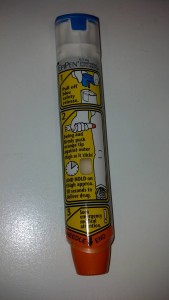 The death of a Texas middle-school student last week is another high-profile anaphylaxis tragedy. Anaphylaxis is a severe allergic reaction that can be fatal. Emergency treatment for severe cases involves prompt administration of a shot of epinephrine (adrenaline) and a call to 911 (the epinephrine shot wears off in a few minutes and additional treatment may be needed).
The death of a Texas middle-school student last week is another high-profile anaphylaxis tragedy. Anaphylaxis is a severe allergic reaction that can be fatal. Emergency treatment for severe cases involves prompt administration of a shot of epinephrine (adrenaline) and a call to 911 (the epinephrine shot wears off in a few minutes and additional treatment may be needed).
People with known allergies to things such as peanuts or bee stings frequently carry an “epinephrine auto-injector,” frequently referred to by the brand name EpiPen®. The auto-injector requires a prescription. Some people may not realize that they have (or have developed) a severe allergy. They may have had prior exposure with no reaction or only a mild reaction, but develop a severe reaction upon a later exposure. And young children may not have the ability to assess symptoms or administer the shot to themselves.
A significant percentage of severe allergic reactions occur in school. Until recently, the law was not clear on who could administer an EpiPen® to a student with a prescription, and there was no provision for stocking auto-injectors as a means of first aid for those without a prescription.
 This last summer, a new law took effect (pdf) in the State of Washington that at least partially addresses the issue of epinephrine auto-injectors in schools. Doctors may now prescribe, and schools may now stock, a supply that is not tied to a prescription for a particular student. A school nurse may administer the shot to any student, even those without a prescription on file with the school, and designated trained school personnel may administer the shot to a student who does have a prescription on file. The law provides immunity for the doctor, pharmacist, school, and staff provided the procedures specified in the statute have been followed.
This last summer, a new law took effect (pdf) in the State of Washington that at least partially addresses the issue of epinephrine auto-injectors in schools. Doctors may now prescribe, and schools may now stock, a supply that is not tied to a prescription for a particular student. A school nurse may administer the shot to any student, even those without a prescription on file with the school, and designated trained school personnel may administer the shot to a student who does have a prescription on file. The law provides immunity for the doctor, pharmacist, school, and staff provided the procedures specified in the statute have been followed.
As a result of opposition from the School Nurse Organization of Washington, the new law does not explicitly permit non-nurse staff to administer an EpiPen® to a student who does not have a prescription on file. Thus it does not provide immunity to schools or staff in the case of administration by a non-nurse to a student who does not have a prescription. Some people believe, however, that administration of the EpiPen is low-risk first aid and that the greater risk is to delay treatment when presented with symptoms of anaphylaxis.
Schools should review their policies related to prevention and treatment of anaphylaxis and consider stocking a supply of auto-injectors as now permitted by the new law. Please contact Nat Taylor or Daniel Ichinaga if you have any questions.
